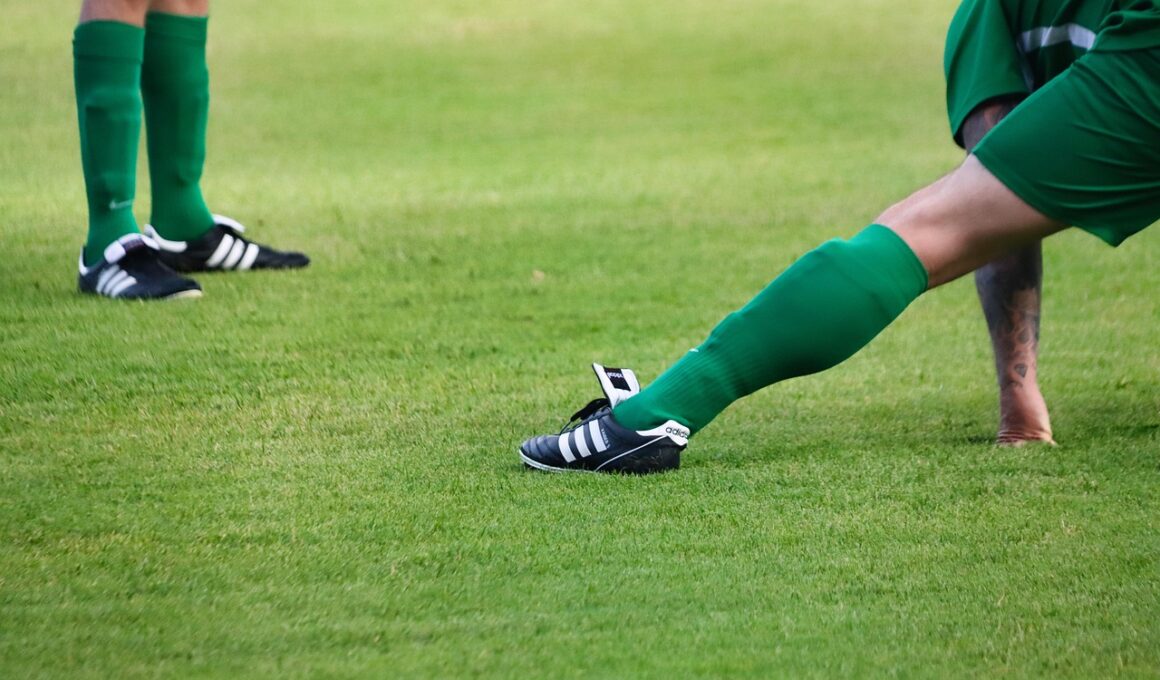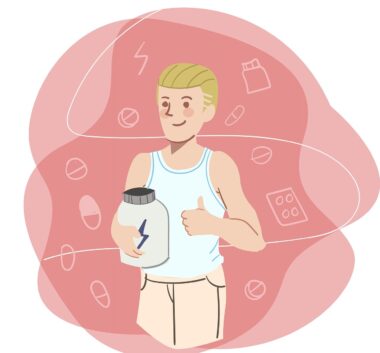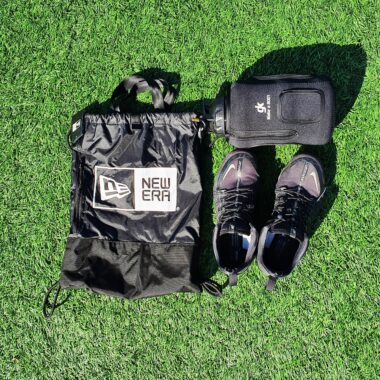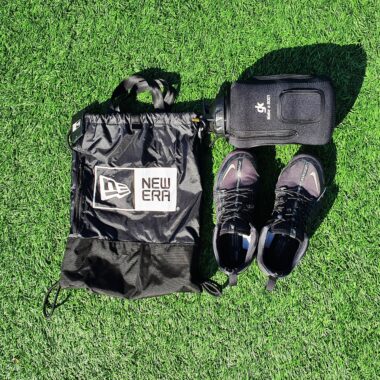The Best Warm-Up Routines Before a Futsal Game
Before stepping onto the futsal court, an effective warm-up routine is essential. Engaging in an appropriate warm-up helps players prepare their bodies for the physical demands of the game. It reduces the risk of injuries while increasing performance efficiency. A good warm-up should include a mix of dynamic stretching, light aerobic activity, and specific gameplay maneuvers. This comprehensive approach ensures that every muscle group is activated and ready for action. Players typically begin with a light jog or skipping to increase their heart rate, gradually transitioning to more intensive activities. Including some ball skills like dribbling or passing during the warm-up can also get players mentally engaged. Routines should last between 15 to 20 minutes, allowing players to focus thoroughly on their body coordination and mobility. Professionals always emphasize the importance of consistency in warm-up routines, recommending players adopt particular patterns they find effective. This effort will make them feel more prepared and at ease as they start the game. Utilizing tips from coaches on proper warm-up techniques can significantly enhance overall performance and mitigate the risk of unforeseen injuries.
The dynamic elements of a warm-up are crucial for enhancing agility and overall readiness. Incorporating drills that mimic the expected movements in a futsal match gears players for the sport. High knees, butt kicks, and lateral shuffles effectively activate key muscle groups, promoting blood circulation. Players should focus on switching directions quickly, which mimics typical futsal movements. Each exercise should last around 30 seconds, providing adequate intensity to stimulate muscles effectively. Additionally, warming up joints through controlled mobility exercises can protect against injuries. A focus on the hip, knee, and ankle joints pays dividends in the long run. Coaches often use this phase to instill game strategies, encouraging players to utilize skills in warming drills. Timing these warm-up exercises well is essential to ensure they fit into the allocated pre-game period. Engaging with teammates during this time fosters team cohesion, enhancing overall chemistry for the match. As breath control and concentration sharpen, players feel more connected to the game. Boosting communication amongst players during warm-up activities can also enhance team dynamics, translating into synchronized gameplay throughout the match.
The Importance of Stretching
Another vital component of warm-up routines is stretching, specifically dynamic stretching which helps prepare the body for futsal’s quick movements. Unlike static stretching, which is best saved for post-game recovery, dynamic stretching warms up muscles while maintaining flexibility. These stretches include leg swings, arm circles, and torso twists, engaging various muscle groups. Such activities foster improved range of motion, allowing players to effectively maneuver during the game. Stretching helps prevent injuries by gradually increasing muscle elasticity and flexibility, critical for rapidly changing motions in futsal. Players should spend at least five minutes performing these stretches, alternating between muscle groups for a balanced approach. They can target specific areas that feel tight, but should always listen to their bodies to avoid overextending. Involving a partner for dynamic stretches, such as resistance bands or partner leg swings, can add an element of fun while improving effectiveness. Connecting with a teammate during this time cultivates cooperation, which is integral for successful gameplay. The prospect of maintaining peak physical condition can only be realized through proper warm-ups, ensuring that players are not only warmed up but ready and eager to perform their best.
To integrate both mental and physical preparation, players should include visualization techniques as part of their warm-up routine. Envisioning successful plays and strategies reinforces a positive mindset, critical for peak performance in competitive scenarios. Taking a moment to visualize passing sequences or effective defensive moves can enhance player confidence before the game. Coaches often recommend dedicating a few minutes to visualization amidst other warm-up activities, amplifying the psychological aspect of readiness. This can be done quietly while moving through stretching exercises or standing still while focused. Furthermore, engaging in deep, controlled breathing patterns can center players’ minds and help manage pre-game nerves. Breathing exercises encourage mental clarity, enabling players to perform without undue stress or anxiety. Combining mental visualization with physical readiness creates a holistic pre-game routine, aligning body and mind for optimal performance. Players who take this approach tend to work effectively as a unit, translating their mental preparation into positive action on the field. By dedicating time to these techniques, teams can foster self-assurance, resulting in a more cohesive and competitive effort during futsal matches. Implementing game-specific drills into warm-ups provides an exceptional advantage. Drills simulating real match conditions help players adapt fluidly to the game’s rhythm. Activities such as small-sided games or passing drills can seamlessly blend into warm-up routines. These swift, intense engagements help increase cardiovascular readiness while enhancing teamwork. When practicing short passes and quick transitions, players sharpen their on-field decision-making skills. Coordinating such drills where players are required to think and react swiftly resembles actual match scenarios, giving them an edge. Coaches can set up various stations that focus on different skills, requiring players to rotate after a timed interval to maintain high engagement levels. Adding opponents during these drills creates a competitive feel, igniting players’ motivation. The camaraderie fostered in these drills not only boosts morale but creates lasting bonds among teammates. As they execute these routines, they not only ignite physical readiness but build trust in one another, crucial for effective game execution. The blend of competition and practice enables teams to start games at a higher intensity, reducing the time needed to adjust once the match commences. Finally, the cool-down period following a warm-up can significantly enhance the overall effectiveness of the session. Once players are fully warmed up, engaging in light movement post-warm-up can help transition into game readiness. Following high-intensity drills with low-intensity activities, like walking or light jogging, allows heart rates to gradually stabilize. This approach nurtures both cardiovascular health and recovery preparation. Finishing the warm-up with deep static stretches helps maintain flexibility gained during warm-up exercises while ensuring muscles remain relaxed, promoting a smooth transition into gameplay. A cool-down should last no more than five minutes, emphasizing recovery and mental readiness. Coaches often emphasize reflecting on team strategies during this time, ensuring players remain focused and aligned. The importance of hydration cannot be overlooked during warm-ups and cool-downs. Consuming fluids helps maintain peak performance while preventing cramps or fatigue during games. By integrating both warm-ups and cool-downs effectively, teams enhance overall performance levels. As players feel more physically secure and mentally composed, they can execute their strategies more successfully, resulting in a stronger, more resilient team unit on the court. In conclusion, adopting effective warm-up routines is integral to achieving peak performance in futsal games. A thorough approach not only helps reduce injury risk but prepares players for both physical and mental challenges ahead. By combining dynamic stretches, agility drills, visualization techniques, and game-specific exercises, teams set themselves up for success. As players respectfully engage with each other during warm-up sessions, it enhances team spirit, promoting cohesion that carries over into gameplay. Consistency is paramount; teams should adhere to their warm-up routines, tailoring them to individual needs while fostering collaboration. Coaches play a pivotal role in this process, guiding players in structuring these warm-ups effectively, thereby creating an environment conducive to success. Moreover, the possible impact of hydration and nutrition before games must not be neglected, significantly influencing overall performance. Teams can further flourish by continuously reviewing and adjusting warm-up routines based on performance feedback. Therefore, every futsal player must regard warm-up routines as just as important as the game itself, ensuring they bring fully charged energy, confidence, and skill to the field whenever they compete. Emphasizing the significance of warm-ups can enhance players’ performance and longevity in futsal, creating a sustainable sporting culture. Ultimately, learning and sharing insights about best warm-up practices can transform a team’s preparation process. Players should not only embrace these routines but also be open to experimenting with new techniques as personal or team dynamics evolve. Henceforth, ongoing discussions about warm-up practices can spark creativity, encouraging players and coaches to innovate how they prepare. Ongoing communication about their effectiveness lays the groundwork for improvements every season, resulting in continuous growth. It is essential to understand that every player has unique preferences and requirements, which should be respected during warm-up planning. By customizing these activities to suit varying needs, teams increase individual investment in preparations. Consequently, every player feels empowered, knowing their contributions are valued in enhancing collective performance. Bringing a sense of joy into warm-ups naturally creates excitement leading into matches, serving as a positive success factor in the season. As they bond over shared experiences and challenges faced on the court, players can strengthen their resolve to face upcoming adversities together. Such warmth is crucial to fostering a resilient team culture, ensuring sustained enthusiasm for the sport of futsal.





